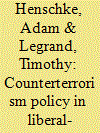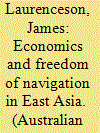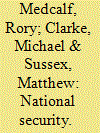|
|
|
Sort Order |
|
|
|
Items / Page
|
|
|
|
|
|
|
| Srl | Item |
| 1 |
ID:
154812


|
|
|
|
|
| Summary/Abstract |
Aside from NATO, the Five Eyes intelligence network between the USA, the UK, Canada, Australia and New Zealand is the world’s most enduring multilateral arrangement of its type. While the Five Eyes network does not constitute a formal security alliance in the classic sense of the term, it does emulate significant features of how alliances operate in practice, including active burden-sharing and intra-alliance bargaining. Most analysts claim that the USA dictates in hierarchical fashion the terms and conditions of how the Five Eyes network functions, and that junior partners have little alternative but to fall in line if they want to preserve the flow of high-grade intelligence from Washington. Using Australia as a case study, this article shows that a more fluid relationship has been at play, one that challenges conventional assumptions about asymmetrical alliances and the role of junior partners.
|
|
|
|
|
|
|
|
|
|
|
|
|
|
|
|
| 2 |
ID:
154813


|
|
|
|
|
| Summary/Abstract |
This article considers the moral limits to national security policies. While it may seem self-evident that there are, and ought to be, limits to counterterrorism policies, there is an increasingly widespread public opinion that political leaders can, and must, do everything they can to protect against terrorist acts. Liberal-democratic societies are facing the threat of domestic terrorism, and for a political leader to say that ‘we cannot stop all terrorist acts and, indeed, neither should we’ would sound the death knell for their career. This article seeks to specify the limiting conditions around counterterrorism policy by reference to policymakers’ public justifications offered for counterterrorism policy. This article presents three normative elements that underpin counterterrorism policy to show that there are important reasons to limit counterterrorism policy, and to suggest that these limits ought to be recognised by political leaders and citizens alike in liberal-democratic societies. Having set out three limiting factors on counterterrorism policy, the article then shows that these factors do indeed play a role in UK counterterrorism policy development—that is, in recognising the justificatory apparatus for national security policies, limiting conditions ought to be found that are sensible to, and accepted by, the proponents of such policies.
|
|
|
|
|
|
|
|
|
|
|
|
|
|
|
|
| 3 |
ID:
154807


|
|
|
|
|
| Summary/Abstract |
Public calls for a more aggressive regional response to China’s pressing of its territorial claims in the South China Sea are typically couched in terms of the threat posed to freedom of navigation. Yet this invites an obvious question: If freedom of navigation, a vital interest for nearly every country in the region, is at risk, why has the regional response to China’s actions to date been so limited? This article argues that one compelling explanation lies in the economics of freedom of navigation in East Asia. Put simply, the risks of freedom of navigation being impeded are frequently overstated, and a more sober assessment of these risks can reduce the incentive that countries have to take more dramatic action.
|
|
|
|
|
|
|
|
|
|
|
|
|
|
|
|
| 4 |
ID:
154811


|
|
|
|
|
| Summary/Abstract |
India’s power and interests continue to grow in the Indo-Pacific region and globally, yet its national security policymaking approaches have not kept pace. These may have been barely adequate for India’s twentieth-century experience as a regional power tending towards strategic restraint, but currently constrain India from being able to harness its considerable national capabilities to protect larger and more complex interests. This article identifies five key obstacles to a more coherent and effective approach to national security: lack of staffing depth in policy and intelligence; weak structures for ensuring inclusive consultation in policymaking; a disempowered military when it comes to strategic decisions; a lack of security expertise among civilian officials and politicians; and an absence of whole-of-government guidance in making and expressing policy. Many reforms are necessary, but two enabling early steps are identified and recommended: the creation of a Chief of Defence Staff position to elevate military coordination and authoritative input to policy, and the preparation of a National Security Strategy to define and guide overall policy.
|
|
|
|
|
|
|
|
|
|
|
|
|
|
|
|
| 5 |
ID:
154808


|
|
|
|
|
| Summary/Abstract |
In the process of bringing together this special issue of the Australian Journal of International Affairs, we were struck by how frequently the term ‘national security’ is used and abused, by both academics and policymakers. Some use it to refer to conventional statist threats. Others employ it as a broad catch-all for anything that may create or imply harms against anyone in a particular polity. Still others use the term to justify an array of populist and politicised policy choices with apparently little to justify the link between the threat and the referent object—that is, the thing being secured.
|
|
|
|
|
|
|
|
|
|
|
|
|
|
|
|
| 6 |
ID:
154810


|
|
|
|
|
| Summary/Abstract |
Russia’s return to prominence in international affairs has been in many respects surprising. Russia’s easy seizure of Crimea, its role in Syria and its ambitious pivot eastward have emboldened Moscow at a time of crisis for the liberal order. This article characterises Russian national security policy as a deliberate ‘rebound’ strategy, designed to deliver a rapid return to power and status. The author defines rebounding in respect to four characteristics: a relatively short timeline for the rebounding state to achieve its goals; a strategic (re-)emphasis on territory and hard power; the construction of alternative networks of influence via institutions; and active efforts to undermine existing normative and legal orthodoxies. The author then assesses these in terms of specific Russian national security policy objectives, including in the key domain of information operations. The article concludes that Vladimir Putin has skilfully employed conventional material capabilities and geopolitics, combined with the exploitation of contemporary information networks for instrumental purposes. Paradoxically, though, those same factors will constrain Russian national security objectives in the future.
|
|
|
|
|
|
|
|
|
|
|
|
|
|
|
|
| 7 |
ID:
154809


|
|
|
|
|
| Summary/Abstract |
The foreign policy crises that the USA has confronted under the administration of President Barack Obama have generated profound uncertainty about whether the USA can maintain what has been its consistent grand strategy since the end of the Cold War: primacy. The authors argue, drawing on a neoclassical realist framework, that this uncertainty has been driven not so much by fundamental changes in the international system itself, but rather by how such changes have been interpreted by the Obama administration and its critics. US grand strategy is now caught between approaches best described as the ‘decline management’ of the Obama administration and the ‘decline denial’ of president Donald Trump, which reflects the fracturing of the domestic ‘political support system’ that has underpinned primacy since the end of the Cold War.
|
|
|
|
|
|
|
|
|
|
|
|
|
|
|
|
|
|
|
|
|